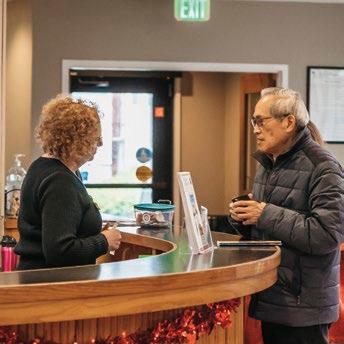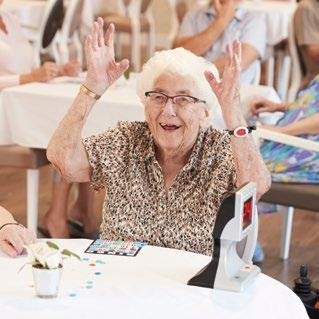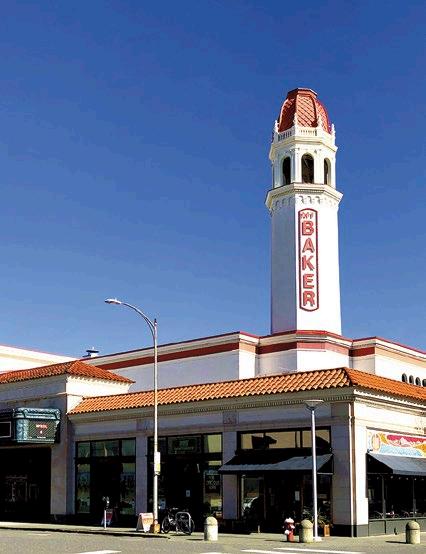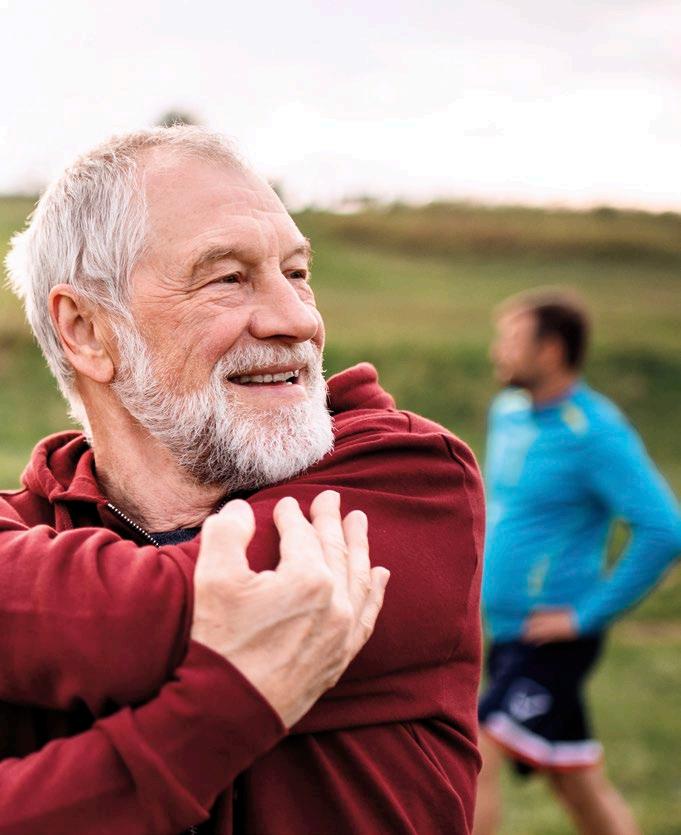

LIVING YOUR GOLDEN YEARS IN THE NORTH SOUND
Advice and Resources for Older Adults
Written by Anne Godenham and Kristen Boehm







OLDER ADULTHOOD IS a phase of life that modern culture sometimes ignores, or even looks down upon. American life is all “hustle and bustle” and “nose to the grindstone,” and once you start entering those later years, people sometimes think life stops moving, or at least stops being fun and interesting.
Of course, that’s so far from the truth that we’ve been able to fill pages and pages with information about the vibrant older community here in the North Sound. There’s no better place to spend your golden years!
Whether you’re entering this phase of life yourself or you’re interested in helping your parents adjust, we’re here to help with a ton of great resources and information—plus some fascinating conversations with people who are making the most of their retirement!
COMMUNITY: RESOURCES, FRIENDS, AND FAMILY
WHEN IT COMES to community for older folks, there are a few really important tenets at the forefront: socialization with peers and people from other generations, available civic and personal resources, and opportunities to engage in pastimes that matter to you.
When you’re first getting started looking for elder communities, senior centers are a great place to start! All over Whatcom, Skagit, and the San Juans, there are dedicated centers where folks can congregate, chat with friends or meet a new beau, have some tasty meals, engage in classes and activities, and access resources. Read on to learn about the Bellingham Senior Activity Center, to get a taste of what our senior centers are all about.
Bellingham Senior Activity Center
If you’re not a resident of Lettered Streets or a frequent visitor to the Bellingham Habitat for Humanity, you might have no idea there’s a building tucked away on Halleck Street, just off Cornwall Avenue, that’s full of people over 50 doing everything from dancing Zumba to playing ukulele.
The Bellingham Senior Activity Center (BSAC) is, at its heart, a gathering space, but it’s so much more than that: Collaborating with Bellingham at Home and Meals on Wheels and More (both of which join BSAC under the umbrella of the Whatcom Council on Aging), the Center provides seniors with a music





PhotobyDani
W i nt er s P h o got paryh

PhotobyDani
W i nt er s P h o got paryh

PhotobyDani
W i nt er s P h o got paryh
studio, a coffeehouse, a gym, a library, a restaurant, and a health center. Monday through Friday, from 8 a.m. to 4:30 p.m. (and from 9 a.m. to noon on Saturdays, for members), more than 300 older adults per day fill the Center with color and laughter.
BSAC Director Molly Simon notes that attendance has soared since they reopened after the pandemic.
“I think we saw during the pandemic how much social isolation hurts people,” she says. “And we came back after the pandemic and just continued to grow—our attendance has gone up, our membership numbers have gone up, the number of programs that we offer are increasing… So people really flocked back to the center.”
Every corner of the Center is dedicated to enriching the lives of our community’s seniors. In addition to the large multipurpose space off the coffee shop, there’s a sizable auditorium where morning dance classes lead into delicious hot lunches. Across the hall from that is a small but well-equipped gym— there’s a strength training instructor on staff—and a healthcare room where members can get help with their Medicare benefits or see a foot care nurse once a week. And then there are the many smaller rooms where BSAC attendees gather to learn languages, share and critique each other’s writing, hook rugs, share stories of queer life, swap recipes, discuss books, shoot pool (Wednesday afternoon is ladies only), do yoga, and just jam, musically and otherwise.
“The Senior Center provides one place where people can come for many, many resources,” says Simon, “including companionship [and] friendship, in addition to all of the things you think about like exercise or food or things like that… We want to provide people with the resources they need as they age, where they're already coming, which is here.”
Even within the services the Center provides, there’s more than meets the eye. The meal service, for example, goes beyond serving hot,
 Photo by Dani Winters Photography
Photo by Dani Winters Photography
house-cooked lunch by donation to people over 60 in the Center itself—the kitchen is responsible for cooking meals for the Bellingham location as well as Ferndale, Blaine, Everson, and Sumas. It’s part of Meals on Wheels and More, which serves around 500 home-delivery clients a week.
Like the Center itself, the meal program relies heavily on volunteers.
“We've got probably, throughout the organization, 100 volunteer shifts a week,” Simon says, “so more than 250 active volunteers in the organization. And so we absolutely couldn't do what we're doing without our volunteers.”
And that generosity of time and spirit is often paid forward by the Center’s attendees. Simon notes that many of the seniors she knows volunteer at various nonprofits throughout the county.
“I know quite a few women who are volunteering either with the Assistance League or other thrift stores… it's a great social place for people to make friends and have purpose.” She adds: “[I] really encourage people to think about volunteering for whatever kind of cause they're passionate about, whether that's the Humane Society or the food bank or the Chore Program. There's so many great local nonprofits [where] it could be a mutually beneficial relationship, because staying active and having a purpose is so important.”
Volunteering is only one of the many ways to get the most out of post-retirement life. When asked what advice she has for older adults who may be anxious about entering a new phase of life, Simon suggests:
“Don't be shy about trying new things and putting yourself out there. Because the people I see that get the most out of their retirement have really made the effort to put themselves out there and take a risk to try something new or to meet someone new. And it's really beautiful when you see it happen.” 315 Halleck St., Bellingham, 360.733.4030, whatcomcoa.org



Creating a community that supports elders doesn’t end with helpful gathering spaces! Local organizations are on the job, too. Some, like Aging Well Whatcom, focus on getting the interests of older adults in front of city, county, and state governments. Others deliver support and services.
Aging Well Whatcom
Launched by Chuckanut Health Foundation in 2017, Aging Well Whatcom is a community initiative that aims to ensure Whatcom County is set up to support its population of older adults, now and in the future.
“Aging Well Whatcom is a collaborative effort with the goal of making Whatcom County a better place to grow old,” says Lara Welker, the project coordinator at Aging Well Whatcom. “We have identified six key areas that we think can and should really be focused on in our community, and those are outlined in the Aging Well Whatcom Blueprint.”
The Blueprint, first released in 2019 and updated in 2022 to reflect life after the pandemic, is available in short and in full on Aging Well Whatcom’s website. Rather than being a list of services or a guide for individuals to follow, “the blueprint is intended to provide a framework that any community or organization can look to [and say,] ‘This is what we’re striving for, this is what we’re trying to create.’”




The six focus areas identified by Aging Well Whatcom are:
• Cultural Shift
Aging Well Whatcom believes the first step to a supportive community is ensuring a culture that respects and values older adults.
• Information & Navigation of Services
While our community has resources and services available to older adults, it can be difficult to navigate and make use of them. Whatcom needs a “robust and easily accessed system… to help all residents get the support and assistance they need.”
• Housing
Affordable housing is a challenge in Whatcom for everyone, and has a strong effect on older adults with fixed incomes. Housing should also include a range of accommodations for aging and care.
• Intergenerational Community Organic exchange and relationships between generations “offer support, mutual learning, and shared meaning” to everyone involved. We need to build up opportunities for and normalize these connections!
• Transportation
Older adults need more options than personal vehicles, pedestrian infrastructure, and fixed public transit in order to have full access to social services and activities, healthcare, and housing options.
• Wellness & Healthcare
This focus envelopes the availability of healthy food, safe physical activity, and a full continuum of mental and physical healthcare (including an adequate caregiving workforce).
The Aging Well Whatcom Steering Committee, which “provides direction and oversight” for the initiative, is made up of representatives from places like the Whatcom Council on Aging, the Opportunity Council, the Whatcom Transportation Authority, and other community and health centers, all working together to build a Whatcom County that better supports older adults.
As an example of recent projects influenced by the Blueprint and the Steering Committee, Welker pointed to the Opportunity Council’s brand new 55+ apartment community, Laurel Forest, which supports multigenerational relationships with “an attached but separate child care facility.”
“Some of the inspiration for both focusing on senior housing and co-locating the childcare center came from the Blueprint,” says Welker.
She also mentioned Aging Well Whatcom’s push to ensure older adults’ interests and voices are considered in the 2025 update to Bellingham’s Comprehensive Plan, a 20-year community building plan that is updated every 8 to 10 years.
At the forefront of Aging Well Whatcom’s efforts is the understanding of the older adult population as a diverse group with varying demographics of age, socioeconomics, location, and more, all of which can affect access to resources.
“There’s just a huge range of experiences of what living [and] aging is like as an older adult, and that depends on so many different variables,” says Welker. As an example, she says, “Living in Bellingham is very different from living in Sumas.” 1500 Cornwall Ave., Ste. 201, Bellingham, 360.671.3349, agingwellwhatcom.org

Other Organizations
Northwest Regional Council (NWRC)
Active since 1971, NWRC focuses on “delivering coordinated support” to seniors, disabled people, and people with complex medical conditions. Spanning Whatcom, Skagit, Island, and San Juan Counties, they help with issues of caregiving, behavioral health, memory care, non-emergency transport, and so much more!
Bellingham at Home
This membership- and volunteerbased non-profit organization empowers seniors to be mutually supportive, engaged, active, and thriving in the homes they love. On top of practical assistance, their support buddies and gathering groups are invaluable opportunities to connect—check out their discussion and book groups, lunches, and even “slo-mo pub crawls!”
Opportunity Council
Although not senior-specific, the Opportunity Council is dedicated to assisting all folks in Whatcom, Island, and San Juan Counties with basic needs, including food, housing, bills, and health. They run four Resource Centers, provide veteran services, and have a Whatcom resource guide at whatcomresources.org.
Community Action of Skagit County
This organization has offices all over Skagit County, and provides services for older adults and disabled folks alongside many other areas of need! Food, bills, care, veteran services, and education and skill-building opportunities can all be found with them.



RECREATION
WE’VE TALKED A lot about serious community building and support, but everyone needs to have fun! There’s a ton of local social groups, hobby classes, and entertainment in our area that’s often intergenerational and welcoming to older adults.
Stage & Screen
For opportunities to take in a show in comfort and style, or to act in one yourself.
• Pickford Film Center ($10 off a basic membership for seniors), Bellingham
• The Lincoln Theatre (senior discounts for film screenings), Mount Vernon
• McIntyre Hall, Mount Vernon
• Mount Baker Theatre
• Bellingham Theatre Guild
• Bellingham TheatreWorks
• The Claire Theatre, Lynden
• New Prospect Theatre, Bellingham
Art
Museums and galleries where you can immerse yourself in the talents of others:
• Museum of Northwest Art, La Conner
• Trinky Busiu Gallery, Sedro-Woolley
• Chuckanut Bay Gallery and Sculpture Garden, Bellingham
• Pacific Northwest Quilt and Fiber Arts Museum, La Conner
• Whatcom Museum, Bellingham
Release your inner artist:
• Tri Dee Arts, Mount Vernon
• MUD Ceramics Studio, Bellingham
• Bellingham Arts, Bellingham
• Jansen Art Center, Lynden
• Mad Hatter Metal Works, Concrete
• Red Barn Art Studio, Bow
Social
Meet new people and make lasting friendships with a little organized fun:
• VB Reads, Village Books, Bellingham
• Open Mic, Trivia, and Karaoke at Lower Tavern, Eastsound
• Newcomers and Neighbors of Whatcom County, Bellingham
• Bellingham Senior Activity Center, Bellingham
• Trivia Night at Kulshan Brewery, Bellingham
• Anacortes Senior Activity Center, Anacortes
• Bellingham Knights Chess Club, Bellingham
• Trivia Night at Skagit Landing, Burlington
• The Rotary Club of San Juan Island, Friday Harbor




Events
The North Sound is teeming with events, especially during the long summer days. Here are just a handful of our favorite welcoming and accessible happenings coming up:
• Skagit Valley Tulip Festival, April, Skagit Valley
• Chuckanut Writers Conference, June 28–29, Bellingham
• Bellingham Festival of Music, June 30 opening night, Bellingham
• San Juan County Fair, August 15–18, Eastsound
• Whatcom Senior Day in the Park: Every summer, the Whatcom Council on Aging puts on a huge event for seniors at Hovander Park, in Ferndale. With more than 100 resources from all over Whatcom, plus a cookout and music, “it's just a really special event that's focused on the older adult,” says Simon. If you’re in Skagit, check out the Skagit Senior Day in the Park!
EDUCATION
ESPECIALLY FOR RETIREES, ongoing education is the best way to stay mentally engaged and be open to new developments in how we understand the world. For elders who’ve already had careers (sometimes three or four of them), you can stay polished in your fields of interest or pivot to new ones. For people to whom education was never much of a priority before, maybe now’s your chance!
Academy for Lifelong Learning
“Enroll in academic and cultural programming; Explore local and regional sites; Enjoy new connections.”
It’s all in the name! If you’re looking to stay curious and keep learning outside of traditional higher education, the Academy for Lifelong Learning (ALL) is a great place to start. Originally started in 1997, ALL is an intergenerational community of learning. It’s hosted and administered by Western Washington University, but is completely driven by volunteers, members, donations, and program fees.
ALL’s diverse courses are short, college-level, and lowpressure, with no tests or homework to stress over. They’re taught by WWU faculty, experts, and professionals and can take place at the Bellingham Cruise Terminal, Ferndale Library, Christ the Servant Lutheran Church, and Western Washington University. They also have a lecture series, interest groups, social events, and plan educational excursions to places like Lake Chelan or the National Nordic Museum in Seattle.
Even if you’re not sold on any courses in particular, a year’s membership with ALL is only $50, and grants you 25% off of course fees, access to WWU’s library, alumni privileges at the Lakewood Boathouse and the Wade King Recreation Center, 10% discount at Village Books and Paper Dreams, and more.
Other educational opportunities
Whatcom Community College’s Community & Continuing Education Program
WCC’s continuing education program is vast and mighty. They offer classes on cooking, wellness and fitness, house and home, gardening, nature and recreation, art and crafts, writing, languages, business and professional development, computers and technology, and even special sections like international travel and healthcare planning.
Your Local Libraries
Don’t forget that libraries are community cornerstones that offer safe spaces, access to information, and classes (usually for free)! Head online or to your local library and look for classes, we bet you’ll see something that interests you.
Cooking Classes
Hands-on, educational, and tasty! Look for cooking classes from Bellingham’s Community Food Co-op, King Arthur Flour’s Baking School at the Bread Lab in Burlington, or The Skagit Table in Mount Vernon.
Arts & Hobbies
Our local businesses love hosting classes and fostering community. You never know what you’ll find if you look around, but we recommend looking for courses with Northwest Yarns & Mercantile, Cloud Mountain Farm Center, and The Great Northern Bottle Shop & Lounge.
Wellness and Culture
You’re never too old to learn more about yourself and others! Workshops at places like WinkWink Boutique and the Whatcom Dispute Resolution Center will teach you communication skills and give you insight to the human condition.




AGE CAN'T BE held off by anything, but proper nutrition and consistent exercise can go a long way toward helping you be more active and comfortable in your later years.
Food
According to the National Institute on Aging, getting the right balance of nutrition is an important element in maintaining your health as you age. While people of all ages need to eat a varied diet that includes a lot of fruits and vegetables, enough protein and fat to sustain healthy muscles, and grains to fuel your energy, there are some dietary needs that shift as we age.
We should all avoid eating too much salt, saturated fat, and sugar, but as our bodies age this becomes even more important. Too much sodium increases the risk of high blood pressure and heart disease—risks that are already increased with the natural process of aging. As for sugar and saturated fats, while everything is okay in moderation (as long as you’re not allergic or otherwise unable to eat something), foods that are particularly sweet or high in fat can cause weight gain, which can be hard on our joints and have a negative impact on mobility.
That’s not to say that you should spend your golden years dieting—please




don’t—but rather that it’s a good idea to ensure you’re getting enough of the nutrients you need and making sure that indulgences aren’t taking over too much of your intake.
If grocery shopping or meal planning is a struggle for you, don’t panic: There are so many services that can help you meet your changing nutritional needs! Meal kit delivery services like the locally-focused boxes from Acme Farms + Kitchen include everything you need, including preportioned ingredients and instructions, to cook a set number of meals that conform to your dietary needs and taste preferences. If cooking isn’t available to you, try a delicious lunch or dinner delivery from Guud Bowls, or sign up for Plantage’s nutritious, ready-toeat meal subscription for convenient weekly pickup. And if the cost of these services is prohibitive, Meals on Wheels volunteers will deliver fresh, nutritious meals to homebound people over the age of 60 on a donation-only basis.
For those who prefer eating out, there are plenty of restaurants in the region that serve up healthy, balanced meals. While restaurant food does often have more salt and fat than what we cook at home, veggie-forward dishes and fresh preparations are a great place to start—and a quick word with your server at any restaurant can work wonders for helping you find the right dish for your nutritional needs.
Exercise
Fitness is a crucial tool in aging healthily—and comfortably. The more thoughtfully and consistently you move your body, in line with your unique abilities and needs, the better you’ll feel as you age.
The National Institute on Aging recommends trying to incorporate four specific types of movement into your routine: endurance, strength, balance, and flexibility. Combining these four types of exercise has been shown to improve
overall health while reducing the risk of injury from repetitive movement.
Endurance exercise is also commonly referred to as aerobic or cardio—it’s intended to increase your heart rate and get you breathing a bit harder for an extended period of time. This improves your heart and lung health as well as keeping your circulatory system (blood flow) in good condition. Anything from a brisk walk to a bike ride will tick this box!
Strength training is focused on building and maintaining muscle, which not only makes everyday tasks like carrying your groceries easier but also helps protect your bones as they age (this is especially important for women, who are prone to osteoporosis). You can do free weights with light dumbbells, work out with resistance bands or on the machines at your favorite gym, or use your own body weight—as long as you’re safely feeling the burn, you’re improving your muscle strength.
Balance exercises are exactly what they sound like: exercises to help improve balance! This is especially important for older adults, because as we age, falls have more serious consequences. One popular type of balance exercise is Tai Chi, a slowmoving meditation that originated in China as a martial arts practice; you can also do something as simple as regularly standing on one leg for a brief time, then switching legs (make sure you’re near a wall to catch yourself if you wobble).
Flexibility exercises are intended to increase range of motion and make everyday life both easier and more comfortable—it’s all too easy to take flexibility for granted, until you lose it because you’re not maintaining it! Gentle stretching at home before bed, in the morning, or before and after exercise is an easy way to work on your flexibility.
Want to hit all the marks with one exercise class or activity? You might be surprised at how many options you have! Swimming is a great full-body exercise, and if laps don’t appeal to you you can get the same low-impact benefits from aquacise (also known as water aerobics). The Skagit YMCA in
Mount Vernon has a fantastic pool and great water aerobics classes!
Dancing is a super fun way to get your heart rate up and increase balance and strength—just make sure you stretch before and after! Dance is for everyone, including those of us who might not think we ‘qualify’; Bellingham dance company Kuntz and Company even offers a class for dancers with Parkinson’s and other neurological disorders.
Yoga combines breath work, stretching, balance, and strength training for a whole-body workout that’s also great for your mind. Classes range from faster-faced vinyasa routines to restorative supported poses, and most teachers will happily help students adjust their practice to fit their unique needs. Some studios, like Crescent Moon Yoga in La Conner, also offer chair yoga for students with mobility issues.
Most gyms and fitness centers offer a variety of classes for all ages, often
including older adults. These range from low-impact dance or aerobics classes to guided strength training programs. If your gym doesn’t have classes that will work for you, check out Ageless Fitness—they host regular senior group classes at different locations in Skagit and Whatcom counties–or visit silversneakers.com to find online or in-person exercise for seniors.
Nature
While the outdoors is a resource available to all ages in the North Sound, it’s a particularly rewarding way to maintain your mental and physical health in older age. Sometimes there’s a concern about accessibility or being able to get help when in the great outdoors, but with research and planning, these can be accounted for. There’s also tons of ways to engage with nature that are low-impact and won’t restrict your access to emergency services.



Hikes for All Abilities
There are hundreds of trails in our area; we’re only naming a few. Up in Blaine, the Semiahmoo Spit has a .8-mile paved trail with gorgeous water views, while the Point Whitehorn Trail at Point Whitehorn Marine Reserve is a 1.6-mile loop that’s mostly flat and fully accessible.
Off the beaten path, you can find several accessible trails near Newhalem, a small town on the banks of the Skagit River. The Sterling Munro Boardwalk is 330 feet of easy-going views and begins near the North Cascades Visitor Center. The 1000-foot Rock Shelter Trail is wheelchair accessible and leads to a 1,400-year-old hunting camp under a large boulder. Trail of the Cedars Nature Walk is a .3-mile gravel loop that skirts the Skagit River and leads you through sections of old growth forest.
Rockport State Park in Skagit County is notable for its 670-acres of old-growth trees that are up to 250
feet tall. It has a Discovery Center, accessible parking, buildings, and restrooms, drinking water, and plentiful benches. Right off the parking area is the west-bound ADA section of the Evergreen Trail which leads to an ADA West Loop Interpretive Trail.
Prefer to explore with company? The Whatcom Council on Aging runs two groups: the Senior Trailblazers, which do moderate to difficult hikes on Tuesday and Thursday mornings, and The Button Walkabouts, which take relaxed social walks that usually last about 1.5 hours. You may also want to check out Wild Whatcom’s Wonder Walks, which are beloved for their slow and intentional pace and opportunities to connect with others.
Connect with Wildlife
Older adults can take in the wildlife with fairly low-impact activities! Join in on some birding excursions with the North Cascades Audubon Society, or take part in the Wings Over Water Northwest Birding Festival come



March. Whale watching tours are available from companies like San Juan Cruises. To look up fishing spots with available accommodations like ADA accessibility and restrooms, check out the Washington Department of Fish & Wildlife’s “Places to Go” page at wdfw.wa.gov/places-to-go.
Walk-Through Wonders
Take a day to visit the Skagit County WSU Extension Master Gardener Discovery Garden in Mount Vernon. The 2.5-acre grounds had over 4000 feet of wide gravel paths added between 2019-2021, so navigating the 30 distinctly-themed garden areas is more accessible than ever. Alternatively, combine your love of art and the outdoors with a stroll through the San Juan Islands Sculpture Park or the Western Gallery Outdoor Sculpture Collection at Western Washington University.
Scenic Drives
There’s nothing like cruising around and enjoying nature’s beauty from the inside of a comfy vehicle. We highly recommend driving up Orcas Island’s Mount Constitution! You can drive straight there from the ferry, if you like, and never even have to leave the car. You’ll go through gorgeous Moran State Park before starting up the sometimes steep but entirely paved road. On your drive up the mountain, you’ll pass several pull-offs and even a spacious shoulder where you can stretch your legs and take in the view of the water and rolling hills around you. Once you make it to the summit, there’s a parking area, a beautiful visitor’s center open in the summer months, and an awesome lookout (including a neat stone tower and lots of infographics about the area).
If Orcas Island is a bit far from you, there’s always Chuckanut Drive, Washington State’s original scenic byway. The route stretches almost 20 miles between Bellingham and Burlington and serves up beautiful views the entire way, passing Larrabee State Park, the Oyster Dome hiking trail, and The Oyster Bar restaurant.
HEALTH Q&A WITH DR. DYLAN KEENBERG

AGING CAN BRING up complicated feelings: anxiety about physical changes, excitement about retirement, fear of the new stage stretching before us, gratitude for the privilege of facing all these things… It's different for everyone, and all responses to the process are valid. We spoke with Dr. Dylan Keenberg, a clinical psychologist specializing in existential analysis, to get the scoop on mental health in older adults.
Can you tell us a little bit about your focus on existential analysis and how it relates to the process of aging?
Existential analysis includes an array of approaches to psychotherapy that seek to help clients more fully describe their worldview and explore how they can more authentically approach the struggles they are facing. This is accomplished through clarifying the consequences of their interpretations of themselves, others, and their world, inviting clients to approach their living in more genuine, free, responsible, and socioethically sound ways that tend to promote life satisfaction. … I invite clients into intentionally reflective dialogues about their identity and how they are living, attending to the areas of dissatisfaction that challenge my clients’ sense of having a meaningful life.
What are some of the most common mental health challenges you see in older adults in your practice?
The older adults I work with are often facing emotional struggles in relation to shifts in their worldview, brought on by life challenges that extend beyond their usual means of navigating their sense of self, of others, and of the world. They tend to reach out seeking help in overcoming symptoms of depression, anxiety, anger, relationship discord, and/ or loneliness, to name a few. I have supported clients through exiting their careers, having difficulties relating with their adult children, adjusting to shifts in their physical and/or mental capabilities, struggling with adapting to changes in society and their place in it, grieving the deaths of meaningful others, facing their own mortality, and more.
Does aging present any specific challenges that differ from the usual existential concerns?
I would say that the changes and adjustments involved in aging can have an amplifying or elaborative effect on navigating the existential concerns that a person can struggle with at any point in life. We can be tasked with revising aspects of who we are and our sense of place in the world in responding to age-related changes in our bodies, minds, social roles, and lifestyles. Some people find ways to approach these tasks adequately and meaningfully, while

others may have difficulty integrating these changes in authentic, fulfilling ways.
What practical steps can older adults take to help them adjust to this new stage of life?
When researchers ask people who are in their final stages of life about what has been the most important contributor to their life fulfillment, they tend to identify spending time with meaningful others. My clinical experiences suggest similarly that maintaining connections with the people in our lives who matter to us can promote life fulfillment and offer support when working through the difficulties involved in aging. I encourage clients toward seeking out new opportunities for social connections as well, such as participating in community activities, group hobbies, volunteering, and anything else where like-minded others could be looking for connection as well. For those who are having difficulty in these areas, it may be worthwhile to consult a therapist in effort to process these struggles.
Another suggestion I offer my clients is to recognize that there is no agreedupon way that a person must be an “older adult”. Taking moments to ask oneself who we have been, what matters most about it now, and how to most genuinely spend our days ahead can bring clarity about how to promote our well-being and inspiration toward facing the reality of our finitude in meaningful directions.
SPOTLIGHT: DANIEL LARNER
DANIEL LARNER, WHO’S turning 85 this month, has been retired from his fulltime work at Fairhaven College since 2014, but that doesn’t mean his life has slowed down.
“I was told by all my colleagues who had retired in the years before me that once I'd been retired for a year something very unexpected would appear to be true to me,” Larner says. “And that would be that I would wonder how I ever found any time to work.”
Still, it should come as no surprise that a man whose career has involved a consistent juggling of dedications to higher education, community activism, public speaking, and his own writing pursuits should find it challenging to lean into the slowness of the post-retirement period. During his long career, Larner taught English and Theater at Western Washington University, where he also chaired the Theater department for a year, and then served as Dean of Fairhaven College for seven years before stepping away from administration to teach core sciences, in addition to screenand playwriting.

“I grew up a junior scientist,” Larner says, “and one of my professors said to me: ‘You know what’s your problem, Larner: you've never lost an interest.’”
This assessment is born out by the breadth of Larner’s experience. In addition to his work in academia, he served on the board of the Washington State American Civil Liberties Union (ACLU) for 49 years, speaking frequently on the subject of civil liberties all around the northwest corner for much of that time.
“After 9/11, I sort of put out a notice: ‘have speech, will travel.’ I promised myself that I would not refuse an invitation to speak about civil liberties—particularly civil liberties and national security—anywhere, anytime,” he says. “And my principal thesis was really simple: that you don't increase security by reducing civil liberties… historically, almost every time there was any opportunity to reduce civil liberties in the name of security, it was taken by whatever government was in place in whatever country… including our own. And one of the truisms about civil liberties is that once you lose them, they're very hard to get back.”
Larner was also an early member of the Mount Baker Theatre Committee, a non-profit founded in 1983 with the express intention of purchasing the Theatre building to save it from being split into a multi-screen movie
theater. They succeeded, and still run the Theatre to this day, thanks to the volunteers that make up most of the corporation’s staff. Larner is still on the Facilities Committee there, as well as having more recently joined the Board of the Public Facilities District for the City of Bellingham.
These days, Larner is putting more of his focus on the writing subset of his many interests—“That’s, I hope, probably in my 90s going to be a renewed part of my life.” He serves on the short film jury and script selection committee for the CASCADIA Women’s Film Festival, as well as sitting on the Board of Directors, and he also writes scripts and plays as well as academic journal articles.
When asked about Bellingham’s visibly engaged senior community, Larner says:
“It's emblematic of a vibrant community that doesn't give up. That doesn't leave its problems just lying. There's a lot of seniors I know who are working on homelessness, a lot of seniors who are working with peace and justice organizations. There are a lot of seniors who are working in the arts.”
He adds, when asked what he would say to those who want to join in but are feeling timid: “One of the beauties of being a senior is that it's not harder to learn when you're older—it's easier, because you have so much less to lose.”
 Photo Courtesy of Western Washington University
Photo Courtesy of Western Washington University
HOME & LIVING
AS WE AGE, the spaces we inhabit aren’t always as easy to navigate, and living alone or without assistance can become difficult and isolating. It’s of utmost importance to have a place to come home to that makes us feel safe and comfortable, and to have access to personable, caring help. Here is a short list of strategies that older adults may take when it comes to home and living!
Aging in Place
Aging in place is a relatively recent term for making changes to your home that enable you to stay there as your mobility becomes more limited. This can be as simple as moving a bedroom to a spare room on the ground floor or swapping a tub for a walk-in shower in the bathroom, or it can be as all-encompassing as a major renovation to increase accessibility throughout the home. (Check out our featured home on p.70 and the remodel on p.73 to see more ideas!) And staying in your home doesn’t have to mean going it alone—there are home help aides available, and

PhotobyDaniWintersPhotography

organizations like Bellingham at Home offer members support with things like transportation and household chores.
Senior/Retirement Community
If you’d like to be in a space specifically designed for older adults, surrounded by your peers but still living independently, a retirement community is a great option. Many senior communities— including La Conner Retirement Inn in La Conner, Cordata Court in Bellingham, and Creekside Continuing Care Community in Burlington—also offer tiered services, so that if your needs increase you can access a higher level of care without having to move to a new home.
Assisted Living
This is the next step up in accommodating changing needs! Assistance can come in the form of a caregiver coming to your home, services included in senior communities, and assisted living facilities. These facilities are licensed to help their residents with the activities of daily life in a range of ways, including cooking, cleaning, and even getting dressed or using the bathroom. It’s not round-the-clock assistance or care, but there’s always someone there to help if you need it,
and there will be physicians and/or nurses on staff as well.
Right at Home is a service that offers personalized in-home care and assistance, and operates throughout Whatcom, Skagit, and the San Juans. The caregivers come right to you! Alternatively, Village Concepts has facilities throughout Washington, including in Sedro-Woolley, that offer various lifestyles and levels of assistance!
Long-Term Care Facility
Also known as a care home, nursing home, or skilled nursing facility, this is where you’ll find 24/7 skilled care for anything from physical disabilities to mental healthcare and memory care. This is the best option for people who have serious medical conditions and need consistent monitoring and care—including people who are recovering from surgery or a serious illness, who may come to stay for a temporary period. Many nursing homes offer services like speech or physical therapy, mobility assistance, and palliative care. The Shuksan Healthcare Center by Hyatt Family Facilities is a care home that offers helpful therapies, gentle pets, and aims to support elders with an overall feeling of normalcy.
Hospice Care
The focus of a hospice is to guide and care for residents through the end of their life with pain treatment, emotional support, and medical supervision. Hospice care is all about helping people with terminal illnesses achieve the highest possible quality of life. PeaceHealth Whatcom
Hospice provides skilled hospice care in someone’s own home, community, or facility, or can take patients in at Whatcom Hospice, an affiliated, home-like facility.
DR. ELAINE CRESS, 75, is passionate about exercise, especially for older adults. Cress has her PhD in Kinesiology and specialized in Gerontology during her career; her research, funded by the National Institutes of Health and academic institutions, assessed the impact of exercise on maintaining physical function, reversing loss in function, and how to accurately measure physical function in older adults and people with disabilities. After 30 years as a researcher, she applied her experience in the community—as Bellingham Senior Center’s Health & Wellness Coordinator from 2015-2021, she helped improve their gym, updated their strength training class, and led their Fall Prevention Program.
“Exercise was my avocation that I turned into my vocation,” she jokes, adding: “gerontology was my vocation that I've now turned into my avocation.”
Jokes aside, though, Cress is serious about the benefits of exercise. When asked what her core value is, she says it’s “the duality of exercise in aging with the understanding of physical function,” explaining that exercise is essential to health at any age, but as our bodies age the physical reserves we drew on in youth begin to dwindle, and unless we exercise several times a week we risk losing our physical independence.
“You end up bowing to the process,” she says of aging. “Even Martina Navratolova had to retire—someone who is at the top of their game and doing all the exercise in the world to stay at the top of their game, they meet that edge as well. So it's that ego realization that bows to the process and I think, from my own perspective, that it's better to bow to that process than to resist it.
Cress’s experience as a gerontologist has affected her perspective when it comes to that bow, as well. She’s seen enough older adults go through the physical process of aging to know that it’s always better to have a plan in place for when you reach your physical limitations, even briefly. She and her husband have been proactive about ensuring their current home is set up for them to age in place, and about
“We wanted to know what was out there,” she says, adding that their home’s proximity to the senior center is a big plus, in particular because of BSAC’s dedication to supporting physical activity in the later years.
“I have visited senior centers from the Southeast to the Pacific Northwest, from the Southwest to the Midwest…each community creates a senior center that reflects that community’s values. Some focus on frailty issues and have adult daycare centers. Others may emphasize arts, and in this comparison, BSAC stands out as one that has both evidence-based exercise programs and the variety of programs to engage seniors in staying active [in ways] that are enjoyable, while still incorporating arts, music, discussion groups of various sorts. … This is the most well-rounded senior center for being physically active that I have seen.”
When asked what advice she had for other older adults, Cress stressed the importance of doing regular strength, endurance, flexibility, and balance exercises to maintain independence as long as possible. Researching your options for getting assistance before it becomes necessary reduces the stress of making consequential choices when under pressure of a medical event. It has been said: "It's always too early, until it's too late!"
“My advice is for people to not think that they'll never have to maybe even dip their toe in the water about getting some help,” she says. “If folks are looking for a good place to start, Northwest Regional Council is a fantastic resource. Do your homework and let them know specifically what you're looking for and they can provide a list of what is available in the community.”
Bellingham At Home, which Cress helped to found and get off the ground, helps people age in their homes by offering help with things like transportation, household chores, and regular check-ins. Cress leads a group there called Planning Forward that explores contingency planning for aging-in-place.
“It's very important for our family and quality of life to make sure that we've got things taken care of, because there is an end of life for all of us.” Cress notes frankly.

